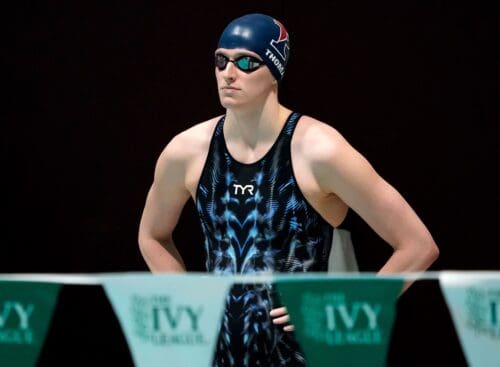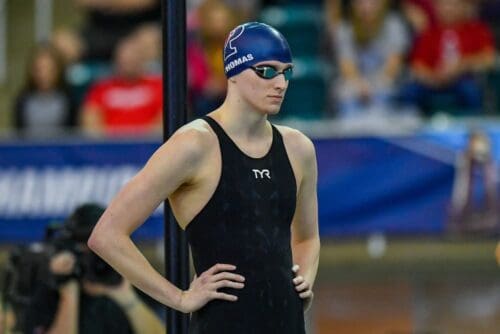lia thomas height, lia thomas
lia thomas height





Lia Thomas’ records are primarily associated with her participation in the NCAA Championships, as there is limited information available about her before that period.
Prior to her gender transition, Lia, formerly known as William Thomas, did not officially exist in records, sparking a controversial debate on transgender women’s eligibility in women’s sports.
The University of Pennsylvania swimmer, Lia Thomas, has been a focal point of controversy surrounding the inclusion of transgender individuals in competitive sports.
While Lia is adamant about her right to compete in women’s sports, there is dissenting opinion on this matter within the public discourse.
Some critics argue that Lia’s transition provided her with an unfair advantage, as she went from being less successful in men’s sports to achieving championship status in women’s competitions.
Lia Thomas’ profile offers a comprehensive overview, including details about her birth, age, nationality, religion, and gender transition.
Born as William Thomas around 1998/1999, Lia is speculated to be 22 or 23 years old as of 2022.
Raised in Austin, Texas, alongside her older brother, Lia attended Westlake High School before pursuing higher education at the University of Pennsylvania.
Her journey into swimming began as a member of the men’s team in 2017, achieving notable rankings in various categories.
Lia’s gender transition started in May 2019 through hormone replacement therapy, marking a significant shift in her personal and athletic life.
Facing controversies, Lia continued to compete, raising questions about the fairness of her success in women’s competitions.
Despite opposition and debates, Lia Thomas became the first openly transgender athlete to secure an NCAA Division I national championship in the women’s 500-yard freestyle in March 2022.
As of her last college swimming event, Lia ranks first in the women’s 500-yard freestyle and fifth in the 200-yard freestyle.
Lia applied to law school after graduating in 2022 and expressed intentions to participate in the 2024 Summer Olympics trials.
However, in June 2022, the International Swimming Federation (FINA) voted to restrict transgender athletes from professional women’s swimming, affecting Lia’s Olympic aspirations.
Despite the setback, the University of Pennsylvania nominated Lia for the 2022 NCAA Woman of the Year Award.
The controversy surrounding Lia Thomas has sparked public debates, with differing opinions on transgender athletes’ inclusion in competitive sports.
Parents of the University of Pennsylvania swim team members have called for Lia’s ineligibility, leading to resignations and protests.
Lia Thomas received support from the University of Pennsylvania Law School, the Ivy League, and various organizations amidst the controversy.
Lia’s sexuality remains undisclosed, and as of 2022, she is believed to be single.
Despite the controversies, Lia Thomas has accumulated a net worth of around $500,000, earned through her achievements in both men’s and women’s swimming.
Lia’s parents have remained anonymous, and details about their stance on her coming out have not been disclosed.
Lia’s weight is 60 kg, but assertions that her height and weight give her an advantage in swimming competitions are debunked by considering other biological factors.
Born as William Thomas, Lia transitioned at the end of high school and officially adopted her new name on New Year’s Day in 2020.
Lia Thomas’ presence in the sports world has polarized opinions, with some viewing her as a trailblazer for transgender athletes, while others question the fairness of her participation in women’s sports.
lia thomas fast facts





In the realm of Ivy League competitions at Harvard University, the 23-year-old (as of 2023) athlete, Lia Thomas, has emerged as a triumphant swimmer, setting her sights on the 2024 Olympic trials. However, notable figures like Michael Phelps and Caitlyn Jenner believe she should not be allowed to compete.
Growing up in Austin, Texas, Lia enrolled at the University of Pennsylvania in 2017, revealing her identity as a transgender woman in 2019 with the support of her family. She aspires to serve as a role model for young trans athletes.
Despite her record-breaking achievements in women’s swimming, Lia Thomas has faced considerable scrutiny and media attention, prompting debates about fairness in mixed-gender competitions.
The controversy surrounding Lia’s participation in women’s sports is reminiscent of the challenges faced by intersex runner Caster Semenya, whose athletic performance underwent scrutiny.
Renowned swim champion Michael Phelps expressed his view that sports should ensure an even playing field, a sentiment echoed by fellow Olympian Caitlyn Jenner, who advocates for the protection of women’s sports.
Contrasting opinions were presented by trans swimmer Schuyler Bailar, emphasizing that Lia’s prowess should not be solely attributed to her assigned gender at birth and challenging the notion of unfair advantages.
A 2017 literature review in the journal Sports Medicine found no consistent evidence supporting the notion that transgender individuals possess inherent athletic advantages over cisgender peers.
Beyond the controversies, Lia Thomas has a noteworthy background. She grew up in Austin, Texas, began swimming at age five, and excelled as a star athlete before her transition.
Lia’s enrollment at the University of Pennsylvania in 2017 marked the beginning of her collegiate journey, where she initially participated on the men’s team as a freestyle distance swimmer.
Lia’s realization of her transgender identity occurred during the summer of 2018, leading to her public coming-out a year later. She faced concerns about the potential impact on her swimming ability.
Mental health struggles and a sense of being trapped in her body prompted Lia’s decision to transition. Her return to swimming after a pandemic-induced break involved hormone therapy and competition in the women’s team.
Lia Thomas achieved remarkable success at the Ivy League championships, setting records in the 500, 200, and 100 yard freestyle races.
Throughout the challenges, Lia’s family remained a steadfast support system. Her brother, also a swimmer, and their parents accepted her when she came out as transgender.
Lia’s father, Bob, emphasized the family’s commitment to supporting Lia and highlighted the importance of remaining positive amidst negativity.
Lia Thomas aims to be a role model for trans kids in sports, advocating for their right to participate without sacrificing their identity.
Despite public backlash, Lia has found encouragement on social media, with trans advocate Alejandra Caraballo noting the dehumanizing coverage and expressing support for Lia’s struggles.
Lia’s transition, marked by the adoption of the name Lia Catherine Thomas in 2020, was a challenging journey involving self-discovery and grappling with body dysphoria.
Hormone replacement therapy, undertaken in accordance with NCAA policy, involved testosterone suppressants and estrogen supplements to align Lia’s testosterone levels with those of cisgender females.
Lia Thomas, having undergone physical changes like a reduction in height and redistribution of fat, acknowledged the risks of hormone therapy but pursued it to live authentically.
While continuing her athletic pursuits and eyeing the 2024 Olympic trials, Lia Thomas has also applied to law school, aspiring to study civil rights law and advocate for marginalized individuals.
The media storm surrounding Lia’s story prompted her realization that there are diverse ways to make a positive impact, leading her to pursue studies that align with her goal of advocating for civil rights.
In the midst of controversies and challenges, Lia Thomas remains determined to contribute positively to the discourse on trans athletes and create a meaningful impact beyond the world of sports.
The unique journey of Lia Thomas serves as a testament to resilience, self-discovery, and the pursuit of authenticity despite societal scrutiny and debates.
Lia’s story underscores the importance of family support, individual determination, and the need for inclusive conversations about gender identity and participation in sports.
As Lia Thomas continues to navigate her path, her experiences are likely to contribute to ongoing discussions surrounding the inclusion of transgender athletes, shaping the future landscape of sports and acceptance.
